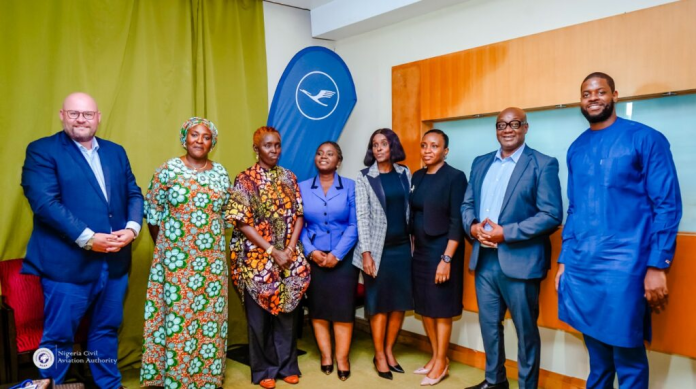The Nigeria Civil Aviation Authority (NCAA) and Lufthansa Airlines have reaffirmed their joint commitment to advancing environmental sustainability within the aviation industry. This shared vision was reiterated at an exclusive discourse event hosted by Lufthansa in Lagos, where both organizations presented their current strategies and future goals for a greener aviation sector in Nigeria.
Representing the NCAA, the Director of Air Transport Regulations, Mrs. Olayinka Babaoye-Iriobe, was represented by the Deputy General Manager for Commercial Agreement and Aviation Environment, Mrs. Evelyn Tanko. She highlighted the NCAA’s statutory mandate under the Civil Aviation Act, 2022, to regulate environmental concerns in the aviation sector. A significant step in this direction, she explained, was the domestication of the International Civil Aviation Organization’s (ICAO) Annex 16 on Environmental Protection into the national aviation regulations.
This domestication, now captured under Part 16 of the Nigerian Civil Aviation Regulations (Nig. CARS), provides a framework for monitoring, reporting, and verifying carbon dioxide emissions from international aviation. Part 5 of the regulations specifically addresses aircraft noise and emission certification, further underlining the NCAA’s commitment to environmental compliance.
Among the key initiatives led by the NCAA is the development of a State Action Plan designed to reduce CO₂ emissions from international aviation activities. Nigeria has also actively participated in the Carbon Offsetting and Reduction Scheme for International Aviation (CORSIA) since its pilot phase in 2018, ensuring the timely submission of emissions data by Nigerian airlines. Additionally, the NCAA is spearheading the development of a Sustainable Aviation Fuels (SAF) Roadmap to guide the future production and usage of SAF in the country.
Mrs. Tanko also acknowledged the complementary efforts of other aviation agencies. The Federal Airports Authority of Nigeria (FAAN) is implementing the Airport Carbon Accreditation (ACA) programme across major airports to curtail airport-related emissions. Meanwhile, the Nigerian Airspace Management Agency (NAMA) has introduced initiatives such as Free Route Airspace (FRA) and Performance-Based Navigation (PBN) to optimize air traffic and reduce fuel consumption.
Despite these proactive steps, she identified several challenges that hinder the full implementation and scalability of sustainability initiatives. These include a fragmented policy environment, limited access to reliable data, insufficient monitoring systems, financial constraints, low institutional capacity, and the need for heightened industry awareness and readiness.
From Lufthansa’s perspective, Mr. Rene Koinzack, Senior Director of Sales for Sub-Saharan Africa, emphasized the airline’s role in supporting sustainable aviation globally and within Nigeria. He detailed Lufthansa’s deployment of Science-Based Target Initiatives (SBTI), which include operating a modern, fuel-efficient fleet, pursuing carbon-neutral flight operations, investing in sustainable aviation fuels, and significantly reducing plastic usage and waste across operations.
The event underscored the shared responsibility of stakeholders across the aviation value chain—including airlines, airports, aircraft manufacturers, and regulators—to implement eco-friendly practices. These efforts must focus on lowering carbon emissions, improving fuel efficiency, developing alternative energy sources, and enhancing operational standards to ensure the long-term sustainability of aviation in Nigeria and beyond.













